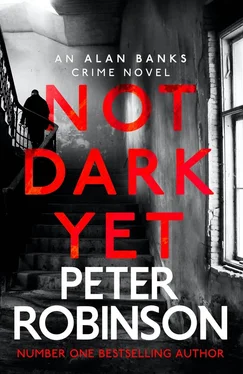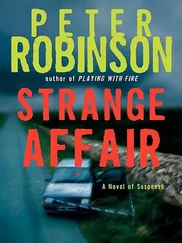Peter Robinson
Not Dark Yet
Zelda hadn’t visited Chișinău since she had been abducted outside the orphanage at the age of seventeen. And now she was back. She wasn’t sure how she was going to find the man she wanted — she had no contacts in the city — but she did have one or two vague ideas about where to begin.
As she walked down Stefan cel Mare Boulevard, she noticed that while many of the shops and their colourful facades were new, the wide pavements and road surface were still cracked and pitted with potholes, and the old ladies in peasant skirts and headscarves still sat under the trees gossiping and selling their belongings to make ends meet. Spread out at their feet lay everything from articles of clothing to children’s toys and pink plastic hairbrushes.
The heat was oppressive, dry, and dusty. Zelda felt it burn in her chest as she walked. And the smell of the sewer was never far away. She looked behind, not because she seriously believed someone might be following her, but because such caution had become a habit. All in all, she knew that she was much safer here in Chișinău than she was back in Yorkshire, or London. She had been worried that Petar Tadić would work out that she had been responsible for the death of his brother Goran, and that he would come to find her. But how could he, she asked herself in more rational moments? Even if he discovered that a woman had killed Goran, there was no reason why he should assume that was Zelda. Goran had abused a lot of women. Why would his brother think for even a moment of that young, frightened Moldovan girl they had raped and abused on a long drive across Romania over thirteen years ago?
The underpass Zelda took to get across the broad road was dark and scrawled with graffiti, mostly swastikas and erect penises. The concrete steps going down were cracked and missing huge chunks, making them awkward to negotiate. The passage was dark and smelled of urine. Zelda picked up her pace, and when she emerged, it was into an altogether different part of Chișinău, an urban wasteland of neglected grey Soviet tower blocks and swathes of sparse grass and spindly trees. A couple of children were kicking a football around, and a scrawny dog lifted its leg against a dead tree.
There were signs of construction — huge piles of dirt, concrete blocks, wooden rafters, metal bars — but the sites were deserted and the mechanical diggers idle. In the midst of all this stood a brand new shopping centre opposite the crumbling blank-eyed stare of the National Hotel. A luxury Intourist hotel in the Soviet era, and once the hottest party spot in town, the National had been built in the late seventies and had stood empty for as long as Zelda could remember. Its decayed grandeur was a cynical reminder of the faded glory of the old days. In front of the hotel stretched a sunken area of dried up and litter-strewn fountains, now overgrown with weeds and home to empty beer cans, broken bottles, used condoms, McDonald’s wrappers, needles, and whatever other rubbish people tossed into it.
Past the Beer House and a row of travel agents and car rental outlets, Zelda wandered into the backstreets off Constantin Negruzzi Boulevard, and before she knew it, she was standing on the very corner from which she had been snatched.
It was a narrow street by Chișinău standards, tree-lined, with a mix of older, more elegant Russian-style buildings and modern uniform Soviet blocks, what Zelda called Stalinist architecture. Everything was grey and pockmarked, chipped and pitted. Very few cars passed by as she stood fixed to the spot. The old bar on the corner was gone, turned into a brand new farmacie , complete with green neon cross, but the rest of the street was much the same.
There, all those years ago, with the dazzling promise of a great future, Zelda’s life as she knew it had come to an end. She remembered seeing the small scuffed suitcase break open on the cracked road surface, spilling what few possessions and memories of her dead parents she had — her mother’s music box, her father’s scuffed leather wallet, the book Zelda was reading — Bleak House — her clothes and the scrapbook and diaries she had diligently kept over her years in the orphanage, and her father’s chipped shaving mug, which broke into fragments when it hit the concrete.
And the photographs. It had hurt most of all to lose the photographs. While there were plenty taken with friends during her years at the orphanage, there were only three that showed her parents. It was too long ago to remember the details, but she did remember the day the suitcase arrived at the orphanage, only a few months after her parents’ deaths in 1992. The contents of the case were the only remnants left of her life from those days.
One photograph showed her father, young and handsome with a shy smile, and another her mother wearing a bikini on holiday in Odessa, with the Black Sea in the background, pretending to strike a sexy pose and putting her hand over her mouth to stifle the laughter. The third showed a stiff and formal family group in a studio portrait taken when Zelda was about three. She sat on her mother’s knee, wearing what must have been her very best dress, hair tumbling in ringlets over her shoulders, and her father stood, straight and serious, in his suit, one hand on her mother’s shoulder and the other on Zelda’s. None of them smiled. All stared directly at the camera.
Zelda had expected that she would feel angry or sad when she returned to the spot where she had lost everything, but all she felt was numbness. Whenever she had looked back on the life that had been stolen, she had simmered with hatred, but now, at the very spot where it had all begun, she felt nothing at all. She thought of all the cars that had driven by since then, all the people who had walked there oblivious, none of them knowing what momentous event had occurred there. Somehow, her own experience was lost in the ceaseless flow of quotidian life, as if she were Icarus falling into the sea, while all around him everyone went on ploughing their fields and tending their sheep.
Now it was just a place, a street corner like any other. Sometimes she wondered who had picked up the music box, her book, the diaries, the wallet, and what they had made of it all. Had anyone actually seen her get taken?
It wasn’t until she approached the orphanage building itself that the full horror of the past hit her right between the eyes, and she began to tremble at the power of the memory. The building was still there, an early twentieth-century Russian construction in the classical style, of dark stone with rococo touches. With its broad steps, small arched portico and chipped columns, it formed a contrast to the monstrous towers surrounding it. The windows on the lower floor had been boarded up, but the upper ones remained uncovered, jagged frames of broken glass.
Zelda couldn’t stop trembling, and the breath seemed to solidify in her chest. This had been her home between the ages of four and seventeen. This was the place that had made her what she was, or what she could have been. Now, though, it was a ruin, and so was she, and the irony didn’t escape her. What the hell was she doing here, running away from the good life she had found, despite all the odds, and from a good man, who was more than she deserved, seeking God only knew what? Revenge? Atonement? Reconciliation?
There were very few people about, and those who were went about their business, heads down, not paying any attention to Zelda or to anyone else. Trying to push the knot of troubling thoughts aside and to control her shakes and breathing, she walked up the steps and, with a quick glance around her, shoved at the door. It didn’t budge. She turned the heavy metal handle and pushed harder with her shoulder, and this time it made a screeching sound, like fingernails on a blackboard, as it dragged across the tiled floor. Again, Zelda glanced around to make sure no one had seen her, then she gave another shove and found herself standing in the hall.
Читать дальше












